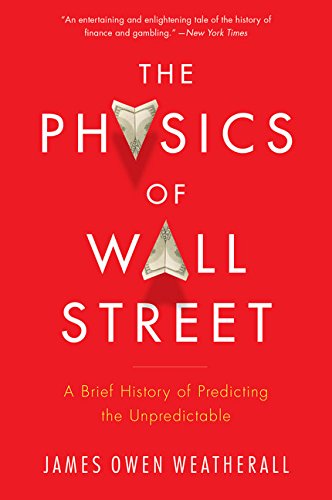Bargain Bin Books
The Physics of Wall Street: A Brief History of Predicting the Unpredictable
Couldn't load pickup availability
Author: Weatherall, James Owen
Edition: Illustrated
Features:
- Mariner Books
Format: Illustrated
Number Of Pages: 304
Details:
“Weatherall probes an epochal shift in financial strategizing with lucidity, explaining how it occurred and what it means for modern finance.”—Peter Galison, author of Einstein’s Clocks, Poincare’s Maps After the economic meltdown of 2008, many pundits placed the blame on “complex financial instruments” and the physicists and mathematicians who dreamed them up. But how is it that physicists came to drive Wall Street? And were their ideas really the cause of the collapse? In The Physics of Wall Street, the physicist James Weatherall answers both of these questions. He tells the story of how physicists first moved to finance, bringing science to bear on some of the thorniest problems in economics, from bubbles to options pricing. The problem isn’t simply that economic models have limitations and can break down under certain conditions, but that at the time of the meltdown those models were in the hands of people who either didn’t understand their purpose or didn’t care. It was a catastrophic misuse of science. However, Weatherall argues that the solution is not to give up on the models but to make them better. Both persuasive and accessible, The Physics of Wall Street is riveting history that will change how we think about our economic future.
Reviews:
"Fascinating history...Happily, the author has a gift for making complex concepts clear to lay readers." Booklist
"A lively account of physicists in finance...An enjoyable debut appropriate for both specialists and general readers." Kirkus
"Anyone interested in how markets work will appreciate this serious hypothesis." Publishers Weekly From the Back Cover Weatherall probes an epochal shift in financial strategizing with lucidity, explaining how it occurred and what it means for modern finance. Peter Galison, author of Einstein s Clocks, Poincare s Maps After the economic meltdown of 2008, many pundits placed the blame on complex financial instruments and the physicists and mathematicians who dreamed them up. But how is it that physicists came to drive Wall Street? And were their ideas really the cause of the collapse? In The Physics of Wall Street, the physicist James Weatherall answers both of these questions. He tells the story of how physicists first moved to finance, bringing science to bear on some of the thorniest problems in economics, from bubbles to options pricing. The problem isn t simply that economic models have limitations and can break down under certain conditions, but that at the time of the meltdown those models were in the hands of people who either didn t understand their purpose or didn t care. It was a catastrophic misuse of science. However, Weatherall argues that the solution is not to give up on the models but to make them better. Both persuasive and accessible, The Physics of Wall Street is riveting history that will change how we think about our economic future. An excellent new book. Financial Times [AU PHOTO] JAMES OWEN WEATHERALL is a physicist, philosopher, and mathematician. He holds graduate degrees from Harvard, the Stevens Institute of Technology, and the University of California, Irvine, where he is presently an assistant professor of logic and philosophy of science. He has written for Slate and Scientific American. He lives in Irvine, California.
"
About the Author:
JAMES OWEN WEATHERALL is a physicist, philosopher, and mathematician. He holds graduate degrees from Harvard, the Stevens Institute of Technology, and the University of California, Irvine, where is presently an assistant professor of logic and philosophy of science. He has written for Slate and Scientific American. Excerpt. © Reprinted by permission. All rights reserved. Introduction: Of Quants and Other Demons WARREN BUFFETT ISN’T the best money manager in the world. Neither is George Soros or Bill Gross. The world’s best money manager is a man you’ve probably never heard of
— unless you’re a physicist...
EAN: 9780544112438
Release Date: 04-02-2014
Languages: English
Item Note: Great shape- pages are unmarked and sharp.Has a remainder mark. Paperback Used - Like New Ships fast! 2014Illustrated
Item Condition: UsedLikeNew
Binding:
Paperback
Share


